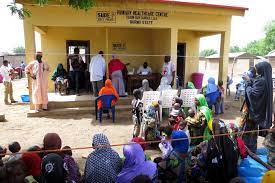By Hassan Zaggi
In this concluding part of our analysis of the recently concluded PHC Summit, the Senate Committee Chairman on Health, Senator Ibrahim Oloriegbe, made some useful observations and suggestions on how our PHC can be reimagined. He also lamented the inadequate utilization of funds in the health sector.
The Chairman, House of Representatives Committee on Health, Hon. Yusuf Sununu, on his part, reechoed some issues and suggested some twists as solutions to the PHC sector.
On his part, the Senate Committee Chairman on Health, Senator Ibrahim Oloriegbe, said that since the signing into law of the National Health Act, not much has been achieved in the health sector.
“Listening to what is said here, I thought not much progress has been made since 2008. I can still reflect what were the recommendations we made.
“Yes, we have made some progress, but we have not made the progress as we should, given the opportunities we have,” he lamented.
He made some suggestions, which according him, if carefully followed will lead to the reimagining of the country’s health sector.
“First, is the financing of primary health care. I want to assure that at the National Assembly we are committed to increasing the BHCPF to what was initially envisaged that is 2 per cent.
“For us to be able to make progress in primary health care, we have to be committed to constitutional amendment to put in that part of the constitution to enable governments at all levels to contribute, at least, 2 per cent of the consolidated revenue fund.
“This should be part of my suggestion in this summit to say that in the next constitutional conference we should have at least, two percent of the consolidated revenue of the federation to be for primary healthcare which is the BHCPF. Why I gave that time line is because I know we cannot get that done before 2023.
“The second one is the health insurance. This National Assembly has passed twice the National Health Insurance Authority. It is twice because the first time we passed it, we made health insurance mandatory, we also provided for the 70 per cent of the group that are vulnerable by providing a Vulnerable Group Fund and we provided the means to achieve that through a tax on mobile phones.
“Unfortunately, the Federal Ministry of Finance pushed us back and said a sector cannot create a tax and use the tax. The ministry said that taxes are created through finance Act. We brought back the bill and it is now with the President. We hope that the President will sign it.”
Poor utilization of available funds
The Senator however, lamented that the resources available in the health sector, not much is being achieved.
“I am sad as participant in the sector. Even what we have now, we are not achieving as much. We need to rethink our system.
“We have the BHCPF, the last report submitted to my committee by the Minister of Health is not encouraging and we should all blame ourselves.
“We have fund for 2019, 2020 and 2021 and we are not using the fund and we are complaining of not having enough money.
“Part of the efficiency is to solve and un-bottle any bottleneck that is not enabling us to do what we supposed to do with what we have. Let us use what we have effectively and efficiently.
“It is unacceptable that the sector have funds and we are not using these fund. Whatever it is, let us remove it. “Because we are asking for more, I have already provided that we will get more but we must use what we have.”
Special categorization for Human resource for health
On the need to address the challenge of human resources for health, Senator Oloriegbe said the challenges are multi-dimensional.
“It is not only about production, is about distribution, it is about retention, it is about utilization and functionality.
“The problems are affected by issues that are outside health. One; we are limited as to what to pay our health workers because there is salaries and wages. There are union issues.
“There are merger between the core health workers and the support services who are just finding themselves working in the industry because when we have what they call Joint Health Workers and in it you have accountant, cleaners and so on, merged with clinical people everybody going on strike and everybody demanding for the same thing. We cannot achieve or reimagining our primary healthcare without addressing this.”
He, therefore, called for what he described as the need to create a special categorization for health workers in the country.
“I am saying this because we do have it. Our security services are special category of workers in terms of their remuneration, condition of service and how they function. You cant hear the military or the police going on strike because they are special category of people. We need to look at that.”
PHC Governance Structure
He also raised the issue of governance in the primary healthcare structure.
He suggested that: “Whatever we may put as resources either money or materials, without the participation of the beneficiary through established leadership who will supervise, monitor and provide governance, we cannot have result.
“We must rethink. We have the system set up long ago about community development committees and so on. But is not effective, we must admit this. How do we reimagine this?” he queried.
The echoes and twists
Speaking, the Chairman, House of Representatives Committee on Health, Dr. Yusuf Sununu, reiterated the stand of the House on the need for a paradigm shift in the health care delivery system.
He disclosed that the House had since passed the amendment Bill of the National Primary Health Care Development Agency (NPHCDA) which is currently with the Senate. This will provide a legal framework for the working of the primary healthcare under one roof among others.
“Additionally, the House Assembly has also passed the amendment bill of the National Health Act and has made a recommendation of, at least, two percent of Consolidated Revenue Fund through the BHCPF.
“This, when assented, will make more funds available not only for the primary health care, but will also achieve the Universal Health Coverage (UHC) in the country.
“It will also help the infrastructural strengthening because part of it will be used in the system,” the lawmaker said.
In another twists, however, Dr. Sununu said the current classification of health into primary health care with domicile with the local government and secondary with state and tertiary with federal government is faulty.
This, according to him, has created a lot of concern among stakeholders as the primary healthcare is supposed to be under the domicile supervision of the local government is assigned to the weakest part of the government.
“As a tier of government we know the numerous challenges being faced by the primary healthcare delivery.
“On personal ground, I am of the opinion that the primary health care should be in the concurrent list.
“This will relieve us from all other challenges of why the federal government is going down to primary health care to deliver services because it will provide the opportunity for collaboration between states and federal government with also the local government.
“It will also create a more avenue for the development partners to align with the system.”
It is pertinent to join well-meaning Nigerians to call on the government to take a critical look at all the recommendations proffered at the summit with the aim of filtering out the best for immediate implementation.
The recommendations and suggestions if carefully mapped and implemented, no doubt, the needed change in Nigeria’s primary health care system has come



